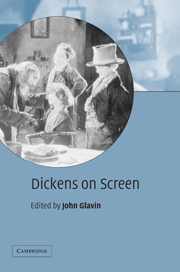1 - Dickens, psychoanalysis, and film: a roundtable
Published online by Cambridge University Press: 22 September 2009
Summary
The Dickens novel, modern psychology, and film line up from past to present, with the Dickens novel of the mid-nineteenth century followed by the invention of psychoanalysis at century's end, followed in the twentieth century by the evolution of film and film theory. If (pace David Hume) we buy into a unidirectional thesis of past cause to present effect, we might then affirm that the earlier discourse may in some measure have affected the later. That is to say something like: the family structure within a Dickens novel is one of the primary determinants of modern psychological, or at any rate psychoanalytical, theory. (We remember that Freud named his famous Dora after David Copperfield's child bride.) And in turn, the Dickens novel and the psychological tradition initiated by Freud contributed in some combination or other to the technical, narrative and psychic structures of film, as Kamilla Elliott's and Garrett Stewart's chapters on Sergei Eisenstein and D. W. Griffith show.
Conversely, influence may be said to flow from present to past. The past is arguably always in some measure a back-formation of the present moment, a function of the present reader or viewer's “horizon of expectations,” what Freud would call a “screen memory” writ large of something irrecoverable in full historical actuality. Thus, the way we nowadays read Dickens is crucially informed by classical psychoanalytic theory, Freudian, Jungian, Eriksonian, Lacanian, Kleinian, or Kohutian, to name a small sample.
- Type
- Chapter
- Information
- Dickens on Screen , pp. 11 - 26Publisher: Cambridge University PressPrint publication year: 2003

